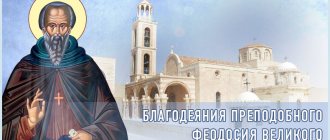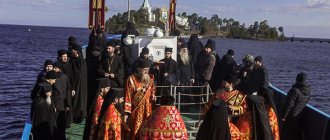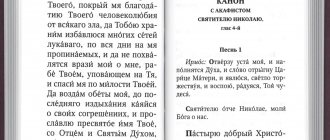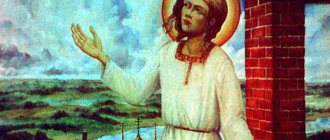Life of Basil the Great
Saint Basil was from Cappadocia, a region in Asia Minor. He was born in 330 in the city of Caesarea and was the eldest son in a large family. Vasily’s parents were believers, so they gave their son a Christian upbringing, but they were also rich, thanks to which Vasily, like his brothers, including the famous Gregory of Nyssa, received an excellent secular education. As a fourteen-year-old teenager, he was orphaned. His father, a famous lawyer, suddenly died, and Saint Basil was left in the care of his grandmother Macrina. Saint Basil lived with her in the suburbs of Caesarea until her death. Macrina was not only a witness to the persecution of Christians by Emperor Diocletian, she retained memories of Saint Gregory of Neocaesarea, the Wonderworker, about whom she told Saint Basil a lot.
At the age of 17, to improve his knowledge, Saint Basil moved first to Caesarea, then to Constantinople, and later to the center of enlightenment of the then world - the city of Athens. Here he studied at one of the Athens schools with his friend Gregory the Theologian, whom he met in Caesarea. Saint Basil the Great easily mastered the sciences and constantly improved in them. He was distinguished by his deep knowledge not only in the natural sciences (mathematics, science and medicine), but also in rhetoric, philosophy, and spoke several languages. As Gregory the Theologian writes about Basil the Great, “it was easier to get out of the labyrinth than to argue with it.”
At the age of about twenty in 357, he returned to Caesarea and became a lawyer. In the same year, Saint Basil was baptized by the Bishop of Caesarea, Dianius. He becomes a reader in church and after some time leaves the practice of law to go on a journey that lasts two years. Saint Basil visited several monastic monasteries in Egypt, Syria and Palestine, where he observed famous ascetics of piety. He would later use his experience as the basis for his own monastic charter, which to this day remains authoritative for the entire Christian world.
Returning from his journey, Saint Basil distributed his part of his father's inheritance to the poor. And since his property was significant, he also managed to build hospitals and asylums. After which he retired to the Iris River. Soon here, together with like-minded people, Saint Basil created an ascetic, monastic community. In his “conceptual solitude,” Saint Basil wrote a lot, including the creation of a number of theological works. Based on the texts of the New Testament, he compiles a collection of rules for moral life.
Very soon, Basil the Great began to become involved in the dogmatic disputes that troubled the region and the Eastern Church as a whole. And when in 362 the noble city dweller Eusebius, far from church problems, ascended to the episcopal see, Saint Basil the Great was invited and ordained presbyter by him. For a long time, Saint Basil the Great has been involved in administrative and ecclesiastical issues of the diocese and preaches.
In 370, after the death of Bishop Eusebius, Saint Basil the Great headed the see and remained as bishop for ten years until his death in 379. He showed himself to be firm and principled, restrained and strict in observing the canons. Always cares about the good of the Church.
Basil the Great, a theologian and philosopher, devoted a lot of effort and attention to liturgical creativity. Probably no bishop wrote more letters than Basil the Great. His conversations and correspondence have survived to this day. We owe St. Basil the current text of the Creed. He wrote a treatise on the Holy Spirit. Saint Basil the Great dedicated a number of works to the interpretation of Holy Scripture, however, only the Sixth Day and commentaries on some psalms have survived to this day. Basil the Great wrote the charter of the monastic community and created instructions for believers who want to succeed in Christian piety. During his lifetime, for his ascetic life, he was nicknamed the Great by the people.
What names are suitable for patronymics?
Patronymic names are formed based on the full name:
- Vasilyevich (for boys);
- Vasilievna (for girls).
An exemplary combination is achieved with boys' names:
- Nazar;
- Nahum;
- Nikita;
- Novel;
- Savely;
- Seraphim;
- Simon.
The middle name interacts most favorably with names for girls:
- Kaleria;
- Lesya;
- Louise;
- Martha;
- Pauline;
- Tala;
- Eda.
The meaning of the name Vasily
The name Vasily came to Russia from Byzantium, where it was very popular. This is evidenced by the large number of ascetics with the name Vasily, canonized as saints back in the Middle Ages. Among them is the Father of the Church, Saint Basil the Great. In total, the Church remembers saints named Basil ninety-six times a year. Among them there are many new martyrs.
The name Basil comes from the Greek adjective “βασίλειος”, meaning “royal”, “royal”. For several centuries, the name Vasily was the second most popular name in Russia after the name Ivan. The name Vasily can be called princely, not only because of its semantic meaning, but also because it was worn by many princes from the Rurik family. This was started by Prince Vladimir, who himself was baptized with the name Vasily. Since the 14th century, the name Vasily has strengthened its significance, becoming a grand duke. Among the princes of the Grand Duchy of Moscow one can recall Vasily I and Vasily II. In any case, the name Vasily was adopted by all classes. So the most famous Moscow holy fool - St. Basil the Blessed - was a peasant by birth.
Interest in the name Vasily in Russia began to decline only at the beginning of the 20th century, when it first moved from the leading position in popularity to the top five, and then to the top ten most common names. By the 60s of the 20th century, the name Vasily acquired the image of a village name. Therefore, they began to call children even less often by the name Vasily.
But if in Russia interest in the name Vasily can be described as wave-like, then in Greece it has not decreased for many centuries. Saint Basil the Great remains one of the most revered and beloved saints of Greece. Remaining an example of a good shepherd, caring for the disadvantaged, sick and orphans, sensitive to the troubles of others and protecting his community, he became the prototype of the Greek Father Frost. It is from Saint Basil that children in Greece receive gifts on New Year's Day.
Full name, shortened and affectionate
In colloquial speech, different forms of the name are used. In official documents the full name is indicated - Vasily. For everyday use, the short and affectionate form of the name is most often used.
Folk fantasy gave the homonym a diverse sound:
- abbreviated – Vasya, Silya, Syura, Shuta, Vaka;
- affectionate - Cornflower, Cornflower, Vasyanya, Vasyuta, Vasilko, Vasko, Vasyunya, Vasyura, Vasyukha, Vasyusha, Vasilyushka, Vasyay, Vasyanya, Vasyata, Vasyakha, Vasyasha.
Liturgy of Basil the Great. What makes it special?
Ten times a year the order of the liturgy changes, and a special service is served, which is called the Liturgy of Basil the Great.
It is celebrated on the day of remembrance of St. Basil - January 14 according to the new style (January 1 according to the old style), as well as on the first, second, third, fourth and fifth Sunday of Great Lent, on Holy Thursday and Holy Saturday. Depending on what day of the week the celebration of the Nativity of Christ and the Epiphany of the Lord falls on, the Liturgy of Basil the Great is served either on the day of the holiday itself, or on the eve of the eve (Christmas Eve) of the holiday.
Usually, the first thing believers pay attention to is that the liturgy of Basil the Great is longer than the liturgy of John Chrysostom that is familiar to us. The chants sung at the Liturgy of St. Basil the Great seem to be longer. This happens because the prayers that the priest secretly says in the altar become longer, primarily the Eucharistic prayer. The choir, with its drawn-out performance, seems to fill the pauses in the service. And of course, the absence of the prayer “It is worthy to eat...” does not go unnoticed, instead of which one performs “He rejoices in You...”. Twice during the service believers hear the name of St. Basil the Great: during the proskomedia and on vacation.
Character
Vasily’s character contains positive and negative qualities. Their development is determined by early education and environment. Above all, Vasya values friendly relations. The direction his life will take depends on the influence of his friends.
Favorable qualities of Vasily include:
- good nature;
- compliance;
- generosity;
- practicality;
- calmness.
Negative features are:
- indecision;
- weakness of will;
- hoarding;
- isolation;
- impermanence.
The season of birth leaves its mark on a man’s temperament and disposition:
- in winter - sociability, optimism, sociability;
- in spring - cunning, cowardice;
- in summer – pliability;
- in the fall - pedantry, responsibility.
Name compatibility
A man reaches complete understanding with ladies whose names are:
- Albina;
- Anna;
- Faith;
- Galina;
- Juliet;
- Evgenia;
- Elena;
- Euphrosyne;
- Lily;
- Margarita;
- Marina;
- Maria;
- Milolika;
- Olesya;
- Olga;
- Rimma;
- Svetlana;
- Tamara;
- Tatiana;
- Julia;
- Yana.
It is difficult to achieve unanimity with the owners of female names:
- Angelina;
- Catherine;
- Zhanna;
- Inna;
- Christina;
- Lydia;
- Love;
- Lyubomila;
- Nellie;
- Margarita.
Signs
January 14 is called Vasily's Day. If the sky is clear on this day, then in the summer there will be a large harvest of peas. If there is a blizzard in the evening, then there will be a lot of nuts, and if there are many stars in the sky at night, then by summer a lot of berries will ripen.
On March 13, on St. Basil the Confessor, there must be a thaw and warm sun - then the harvest will be good.
If many stars are visible on Vasiliev's night, then summer will bring a good harvest of berries
Orthodox name days
January: 5, 8, 14, 15, 20. February: 12, 14, 15, 17, 19, 22, 23, 26. March: 3, 5, 13, 14, 17, 20, 24. April: 2, 4, 5, 8, 10, 25. May: 1, 8, 9, 12, 13, 19, 22, 23, 26, 31. June: 1, 6, 12, 14, 20, 21, 23. July: 1, 5, 8, 11, 14, 16, 18, 19, 28. August: 10, 13, 15, 20, 24, 25, 26, 27. September: 4, 10, 15, 16, 17, 20, 22, 23. October: 3, 4, 7, 13, 15, 17, 21, 23. November: 3, 4, 8, 11, 13, 16, 19, 20, 27, 29. December: 3, 5, 8, 9, 10, 11, 17, 20, 22, 26, 28.
On these days in 2016, those with the name Vasily have Orthodox birthdays. Of course, not everyone is interested and wonders about name days and days of angels. Many consider this empty, unnecessary information. Only believers understand the true meaning of this day. After all, the angel who protects him from troubles and adversity depends on what day a person was born. It is to this saint that they pray and ask him for something very important and sacred.
Famous people
The name Vasily is repeatedly mentioned in history, thanks to famous people who became famous for their achievements in military affairs, politics, and art. The galaxy of outstanding bearers of the name includes:
- military leaders - Orlov-Denisov, Zavoiko, Chapaev;
- politicians - Shuisky, Tatishchev, Golovnin;
- artists - Surikov, Vereshchagin, Tropinin, Polenov, Perov, Kandinsky;
- writers - Belov, Grossman, Aksenov, Zhukovsky, Peskov, Trediakovsky, Shukshin;
- actors - Lanovoy, Livanov, Merkuryev.
The best qualities inherent in the name are endowed with the legendary heroes - Vasily Buslaev and Vasily Terkin. They serve as the personification of wisdom, balance, patience, and optimism.
An old Russian name with royal roots is an excellent choice for a baby.
Author: Elena Bugriy, especially for Mama66.ru









